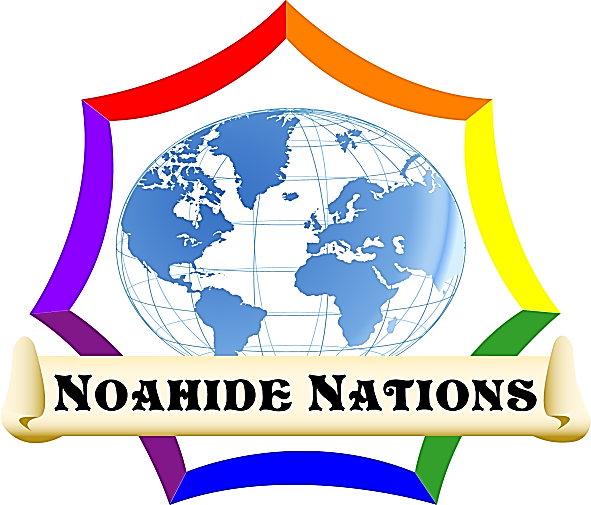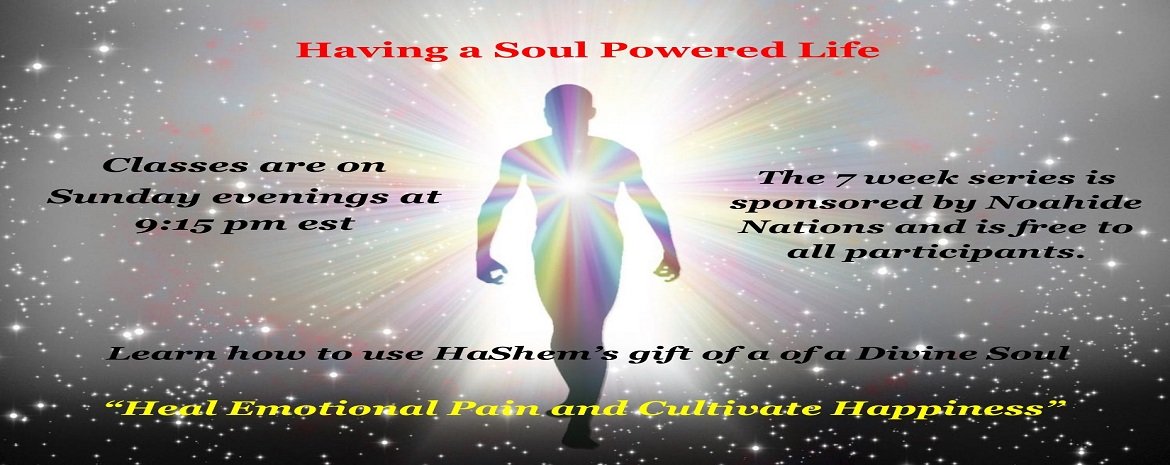
Noahide Torah Courses
Noahide Nations has conducted nearly 3000 live online Torah classes over the past 15 years. Many of these classes are available in audio recordings. Here are just some of these courses.
God's Instructions
When God created man on the 6th day He wanted mankind to live in peace and harmony, through His Mercy. He gave Adam 6 instructions in order to live this way. After the flood He gave Noah a 7th. These are the Noahide Commandments.

Read More +
Noahide Prayer
For Noahides, prayer is considered a mitzvah when performed in response to personal needs or circumstances.

Read More +
Develop a Torah Personality
Help for perfecting your relationship with HaShem and yourself.

Read More +
Listen To Noahide Laws & Life Cycle Class
Listen to the overview from a previous class from the Noahide Torah Study Yeshiva Course.

Read More +
Seek Torah Wisdom
Torah wisdom should always flow through you. Learn about Hashem and you will learn about yourself!

Read More +
After The Flood
Ever wonder what happened when Noah and his family exited the Ark after the Flood?
Wisdom From Pirke Avot
Simon the Just…used to say,
“Upon three things the world stands:
On Torah, on (Divine) Service, and on Deeds of Lovingkindness.”
Pirke Avot 1:2
Ben Zoma said,
“Who is wise? The one who learns from all people…
“Who is mighty? The one who subdues the evil inclination…
“Who is rich? The one who rejoices in his portion….
“Who is honored? The one who honors other human beings….”
Pirke Avot 4:1
The Most Important Part of Studying Torah
The most important element in validating interpretations of the written and oral Torah is the concept of Mesorah. Mesorah is the greatest proof to the authenticity of any concept, practice, or interpretation.
Although the seven Noahide laws have their origins in Adam and Noah, God chose to transmit and preserve them via Moses and the giving of the Torah at Sinai. This placed the Seven Mitzvos within the structure and system of Torah study and learning. Therefore, the seven Noahide laws must be interpreted and understood within the context of the Torah.
This point cannot be stressed enough: Jewish, and therefore Noahide, study and interpretation of the Torah is unique and unlike the study of any other religious texts.
The Truth About the Ger
Don't ever be afraid of seeking truth or speaking the truth, as it says in
Proverbs 12:19...
Truthful lips will be established forever, But a lying tongue is only for a moment
Are Noahides Allowed to Pray?
For Noahides, prayer is considered a mitzvah when performed in response to personal needs or circumstances. If one experiences challenges for which he does not pray, his lack of response is tantamount to a denial of God as the sovereign ruler of all things and all events. When one does pray in such circumstances, it demonstrates reliance and belief in the Creator.
When a Noahide prays to give thanks or praise absent a personal need, he still receives reward for such prayer even though it is not of the same nature as prayer prompted by personal needs.
As with all personal prayers, there are no fixed texts for Noahide prayer. Since all Noahide prayer is essentially personal prayer, it is ideally expressed using sincere words from the heart.
Tools For Noahide Torah Study
The journey of Noahide Torah study is endless in depth and has no destination. You will realize this when your very essence proclaims, "the more I learn, the less I know"! Before you make this proclamation remember that it is a mitzvot for a Noahide to study the Noahide Laws and apply them in every aspect of their life. After you make that proclamation you will realize and appreciate why it is a mitzvot for a Noahide to study the Noahide Laws and apply them. The study of Torah is what gives us our awe of the Creator. The more we study the more awe we gain.
What Constitutes Good in His Eyes?
- Category: Noahide Laws
- Hits: 6976

IDOLATRY-4: What is Good in ELoKiM’s Eyes?
Know your CREATOR, know yourself and know the difference
1: An inventory check
We are following Moses’ First two of the Ten Commandments that constitute the IDOLATRY Commandment. It says:
The First of Moses’ Ten Commandments
1. ”I Am (Essence)
2. YHVH your ELoKIM (Attributes)
3. Who took you out of Egypt land” (His deeds, Kingship) ////////////////////Man/////////////////////
The Second of Moses’ Ten Commandments:
”Thou shall not have another G-d, over my face,
Thou shall not make yourself any carved idol (statue) or any image
of anything in the Heavens above and in the Earth underneath,
and in the waters that are under the Earth.
Thou shall not bow to them and shall not serve them…”
Last class we learned about ELoKiM, the Attribute of Judgment. At creation, we’ve said, the Infinite, indescribable CREATOR who is beyond our conception, ‘set’ on the Throne of Judgment. He ‘wore’ the cloak of a JUDGE while creating the Universe. In other words, the Universe was created to stand a Judgment, a trial. And we, of course, are a part of this comprehensive judgment.
Last class we also counted the ‘features’ of ELoKiM’s Judgment. In other words, we studied the ways He rules the world. Toda y we’ll follow the text and ask: What is GOOD in ELoKiM eyes? The opportunity arrives to answer that question from the text of Genesis Chapter One. As we can see, ELoKiM judged every Day as it says:
“And ELoKiM saw that it is GOOD, and there was an evening and there was a morning, One Day” (or third Day, fourth Day and so on)
Thus at the end of each Day (apart from the second) ELoKiM passed a judgment on the passing Day that He had just finished, to see whether or not it was GOOD. Thus we can ask: what exactly does it take to be deemed GOOD in ELoKiM’s eyes?
2: Several options of what is GOOD in ELoKiM’s eyes
The commentaries offer several explanations for the term GOOD. We should look at all of them as valid. The Torah is often likened to a diamond whose beauty depends on the different slanted surfaces that send sparkles all over. So is every verse in the Torah. You should polish it from different angles to bring forth its beauty. You can’t define what is GOOD in ELoHiM’s eyes by just one aspect. You need to observe it from ‘seventy’ faces, to see its beauty in full. So here are seven explanations of what constitute ‘GOOD’ in ELoHiM’s eyes:
1. ELoKiM was ‘pleased.’
The term ‘GOOD’ can simply mean that ELoKiM was ‘feeling good,’ that He was pleased with His work. In fact, Kabala says that the most primordial reason for CREATION is the CREATOR’S wish to Feel GOOD (nachat ruach.) Man’s tasks, as we’ll see, is to make Him feel VERY GOOD about us.
2: GOOD means COMPLIED with His Law
Another explanation of the term GOOD relates to ELoKiM as a JUDGE. He deems a Day as ‘GOOD’ if it has complied with His Natural Laws. Hence any item that has not complied with His wish was deemed NOT GOOD and eliminated at the end of the Day.
An exception was the trees. ELoKiM told them to bring forth fruits, yet they developed a hard ‘skin,’ kelipah. ELoKiM then decided to allow their ‘skin’ to stay. In Kabala, the term kelipa has come to be used as a metaphor for anything that has rebelled against ELoHiM and survived. The kelipa stands for our bad drives that lead us away from G-d.
3: GOOD is Viable, Endurable
The term “GOOD” also means ‘viable’, enduring, strong. For instance, when the daughter of Pharaoh first saw Moses floating in an ark over the River Nile, she saw that the baby was ‘good.’ It means the baby was healthy, viable, and would survive.
4: GOOD is strong
ELoKiM is perceived here as a Builder of a Six Floor building, the Six Days of CREATION. At the end of each Day, the Builder checks the last Floor whether or not it is strong and viable and ready to enter another Day. He checks to see whether or not the Floor is capable of supporting another Floor on top of it. If the Floor is NOT GOOD, the Builder would eliminate it and start it all over again.
This explains why ELoKiM passed a judgment each Day (apart from the second) at the junction between the passing Day and the new, coming Day. He judged whether or not to allow the items to enter the next Day.
Thus creatures are good, if they can support the next Day. The Third Day’s Vegetation was deemed GOOD, because they would serve the fish, birds and cattle which were born later. The Cattle were GOOD since they would support the BEASTS, and so on.
This applies also to Man. At the end of our Sixth Day we will be judged whether or not we would be ready to enter the next, Seventh Day, which is the Eternal Sabbath. If Man is deemed NOT GOOD in ELoKIM’s eyes, He would terminate us, as He had done to many creatures before us.
5: GOOD means it fits His Plan
‘GOOD’ also means ‘fit.’ ELoKiM the Builder finds the passing Day to be GOOD if it fits His Master Plan for the entire Building. CREATION therefore did not happen at random, but rather according to a Plan.
6: ‘GOOD’ means ‘beautiful.’
“GOOD” also means “good to the eye,” or beautiful. Here lies the notion that the CREATOR is not only a JUDGE, a BUILDER, a KING and a FATEHR. He is also an ARTIST. This aspect of being GOOD was promoted by Abraham, as we’ll see in due course.
7: GOOD means Love
To be good in someone’s eyes it also means in Hebrew to be loved. Hence ELoKiM loved the Days as He created them. Would this notion take a place in the story? Wait and see!
3: Adam has to be VERY GOOD
Whereas in all the Days of Creation ELoKiM was satisfied if He found them to be good, with the Advent of Adam He raised his yardstick and demanded it to be Very Good. Thus at the end of the Sixth Day, just after the creation of Adam, it says:
“And ELoKIm saw everything that He had done and behold, it was Very Good.”
What does it take to be deemed Very Good in ELoKIm’s eyes? On that we’ll learn later.
The next question that we should discuss is this: if ELoKIm stands for the truth, does the story of CREATION as told by Moses reflect the Truth?
This article was originally posted at http://www.noahidesevencommandments.com/type.asp?iType=32


 French (FR)
French (FR)  English (UK)
English (UK) 

























 Choosing a Rabbi
Choosing a Rabbi What Is Tzedakah?
What Is Tzedakah? The Science in Torah
The Science in Torah Why Study Torah?
Why Study Torah? Afterlife, Moshiach & Redemption
Afterlife, Moshiach & Redemption Your Soul
Your Soul